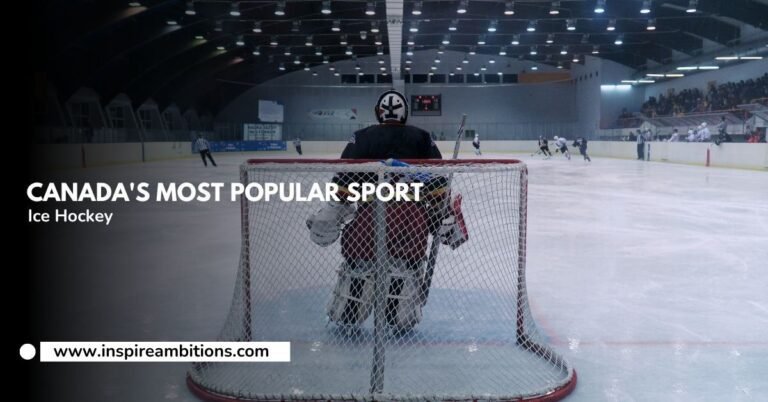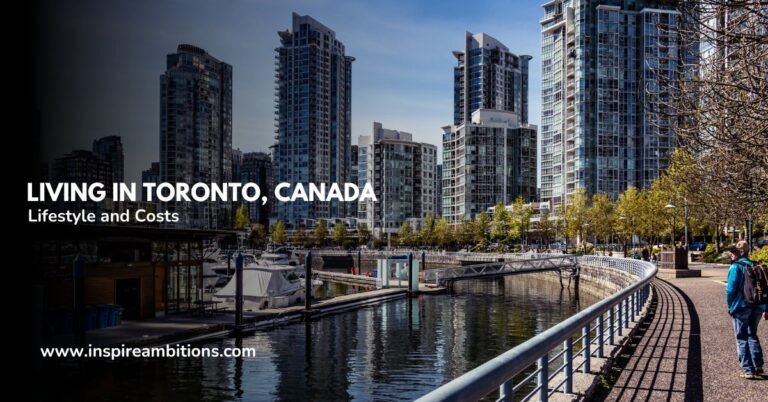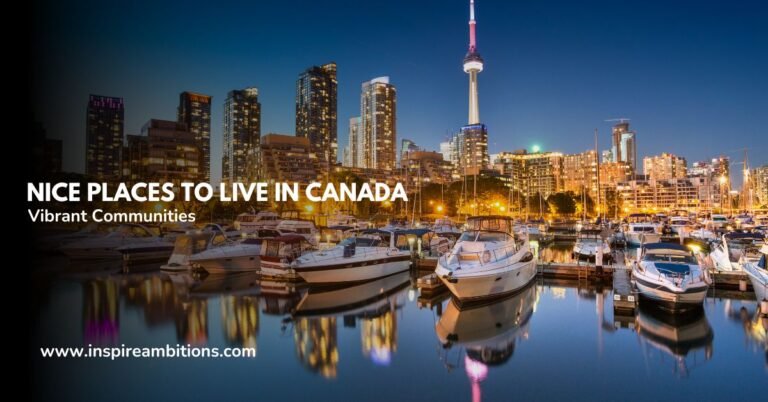কানাডার জন্য ট্রিভিয়া প্রশ্ন - আপনার চূড়ান্ত কুইজ গাইড
Canada’s vast and varied landscape is a treasure trove of facts and lore, making trivia about the nation an entertaining and educational pursuit.
From the longest coastline in the world to the origin of iconic symbols like the maple leaf, trivia questions about Canada offer a delightful way to explore the country’s rich heritage and diverse culture. Canadians, known for their politeness and multiculturalism, provide an array of fascinating topics for any trivia enthusiast.
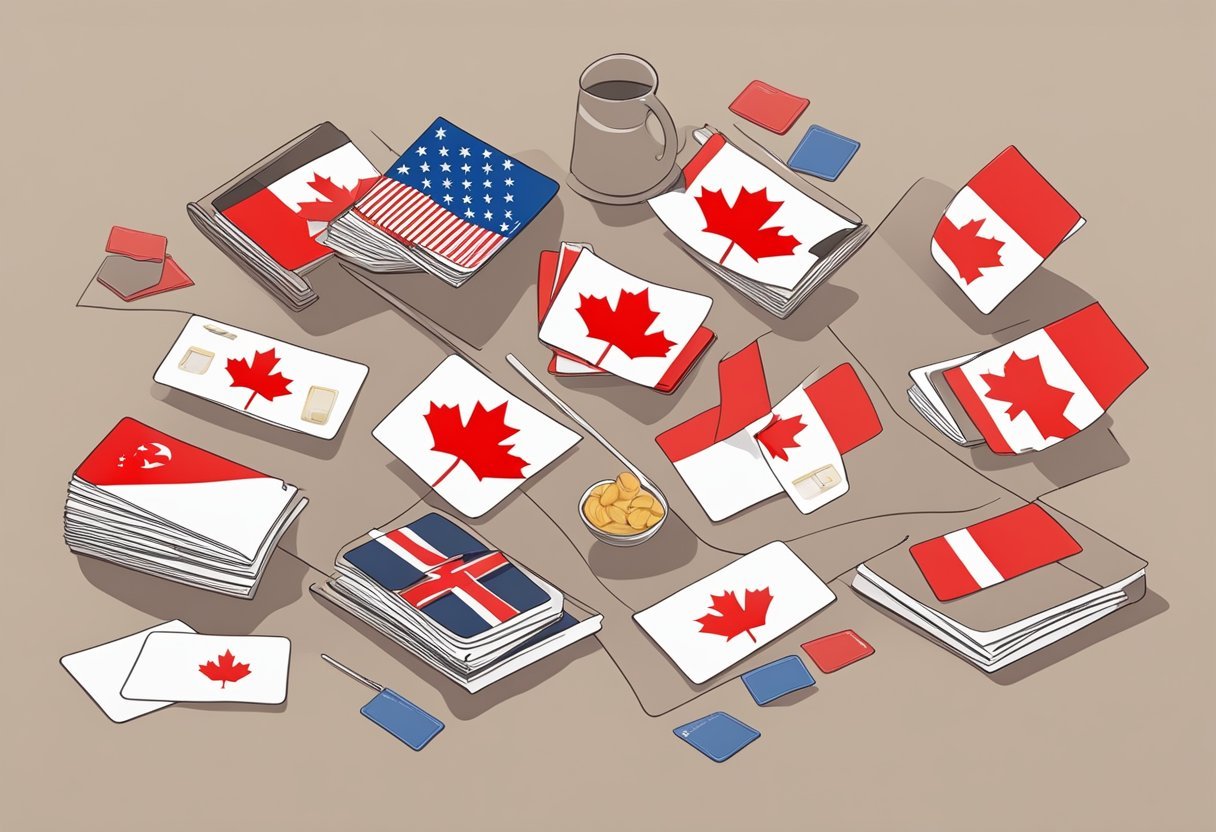
Engaging with Canadian trivia is a fantastic method for residents and visitors to deepen their understanding of the country’s history, geographical expanse, and the influential events that helped shape the nation.
Trivia enthusiasts can test their knowledge and learn more about Canada’s economic and political landscape and its influence on global culture by tackling varied themes from the federation’s history to the vibrant celebrations and national events.
Trivia Questions for Canada – Key Takeaways
- Trivia offers insightful glimpses into Canada’s diverse history and culture.
- Learning through trivia can enhance understanding of Canadian heritage and identity.
- Engaging with trivia questions is a way to connect with Canada’s national events and symbols.
History and Federation of Canada
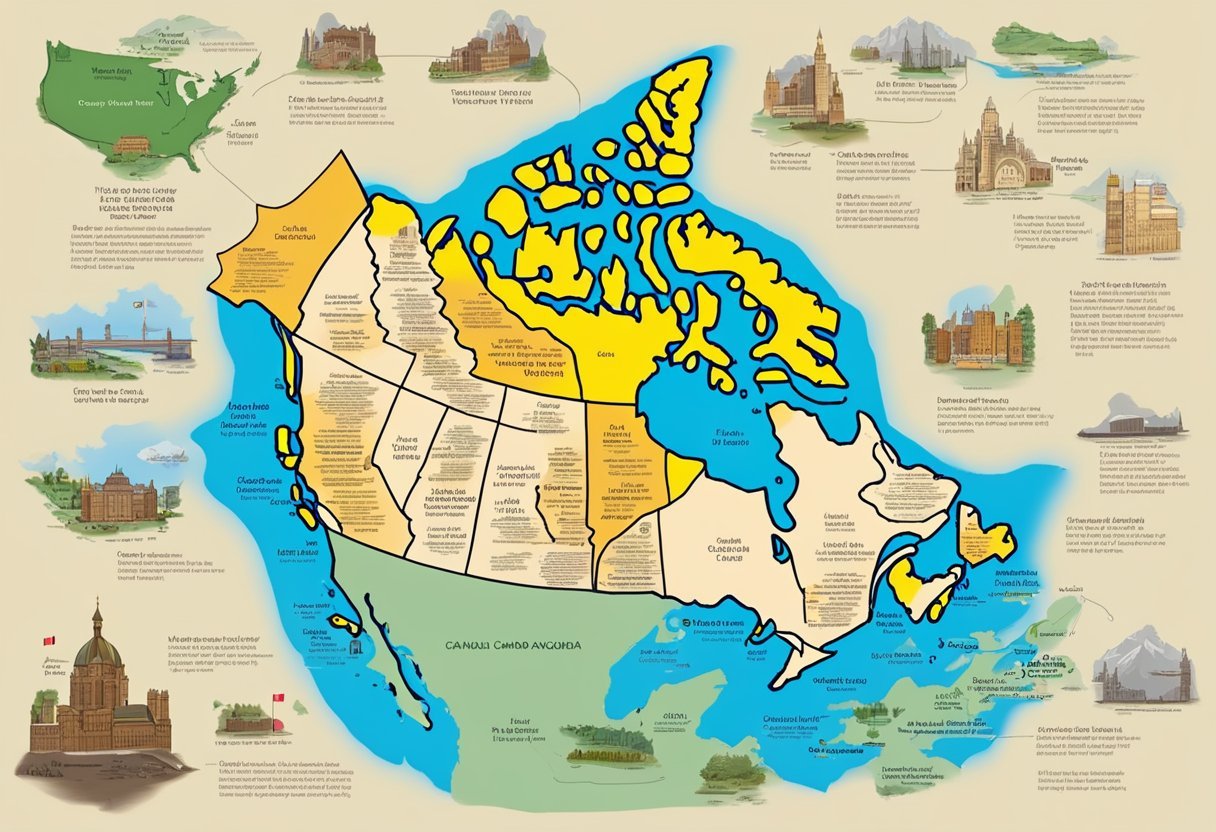
The Federation of Canada marks a pivotal point in your understanding of the nation, tracing its origins from the early settlements to the establishment of its Confederation. This historical journey involves critical aspects such as early explorations, significant wars, blending ফরাসি and British influences, and the eventual founding of an independent country.
Pre-Confederation History
Your exploration of Canada’s history started long before the Confederation. Initially inhabited by Indigenous peoples, the land now known as Canada became a point of interest for European explorers in the late 15th century. Key events include:
- French settlements were established in Quebec, becoming an official language and foundational culture.
- ব্রিটিশ কলাম্বিয়া, initially explored by the British, evolved through gold rushes and settlements.
- The struggle for supremacy between French and British powers influenced the political and cultural landscape.
Formation of the Canadian Federation
The path to unification began with discussions and conferences in the 1860s. Significant milestones in the formation of the Canadian Federation encompass:
- Provinces like Ontario, Quebec, Nova Scotia, and New Brunswick first united in 1867 under the British North America Act, forming the Dominion of Canada.
- The passing of the act by the ব্রিটিশ government paved the way for other regions like Manitoba and নিউফাউন্ডল্যান্ড to join over time.
- John A. Macdonald was the first Prime Minister, steering early federation efforts.
Significant Historical Events
After the formation of the federation, several events shaped Canada’s history:
- World War I, where Canada’s significant contribution on the battlefields of Europe, aided its progress toward independence from British rule.
- The Statute of Westminster in 1931 granted Canada legal autonomy, a step closer to complete স্বাধীনতা.
- Adopting “O Canada” as the national anthem in 1980 reinforced the sense of Canadian identity and pride.
These foundations enrich your knowledge about Canadian history, which underlines the formation of today’s Canada.
Geographical Expanse and Locations
Discover the vastness of Canada, the world’s second-largest country by land area. You’ll journey through its ten provinces and three territories, explore its major cities and capitals, and be awestruck by its diverse and stunning প্রাকৃতিক ল্যান্ডস্কেপ.
Provinces and Territories
Canada is comprised of ten provinces and three territories. Here’s how they are distributed:
- Provinces: Alberta, British Columbia, Manitoba, New Brunswick, Newfoundland and Labrador, Nova Scotia, Ontario, Prince Edward Island, Quebec, Saskatchewan
- Territories: Northwest Territories, Nunavut, Yukon
প্রতিটি province has its capital, such as Toronto for Ontario and Winnipeg for Manitoba. Quebec City holds the capital status for Quebec. Meanwhile, the vast, sparsely populated territories of Yukon, Northwest Territories, and Nunavut are known for their expansive northern landscapes.
Major Cities and Capitals
Canada’s major cities are often also their provincial capitals:
- Ontario: Toronto is also the largest city in Canada.
- Quebec: Quebec City – the capital, with Montreal as the province’s largest city.
- Manitoba: Winnipeg is the capital and largest city of the province.
These cities are influential cultural and economic hubs, with Toronto and Vancouver being well-known for their cosmopolitan vibes and important coastal ports.
Notable Landscapes and National Parks
কানাডার geography boasts many landscapes, from the mountainous regions and lush forests to the majestic Great Lakes and extensive coastlines. Some remarkable landscapes and national parks include:
- Banff National Park: Located in Alberta’s Rocky Mountains, featuring stunning vistas and turquoise glacial lakes.
- Jasper National Park: Also in Alberta, it’s known for its extensive trail network and wildlife.
Canada offers an array of breathtaking national parks and natural splendours, from the rugged Atlantic shores of Newfoundland and Labrador to the Arctic tundra of Nunavut.
Culture, Sports, and Symbols
Discover the rich tapestry of Canadian culture, the enthusiasm for sports like hockey, and the enduring symbols that represent the country’s heart and soul.
Canadian Culture and Languages
Canada’s cultural landscape is a vibrant mosaic, rooted in the heritage of the First Nations and brought to life by contributions from French and English settlers. As a result, both English and French enjoy the status of official languages. Canadian culture is also profoundly influenced by its indigenous populations, including the Cree and other First Nations, whose influences permeate various cultural expressions.
- Languages Spoken: English and French
- Music Contributions: Musicians like Celine Dion and Drake
Sports and National Pastimes
In Canada, sport goes beyond leisure —an essential part of the national identity, with ice hockey taking a revered spot as a pastime and a source of national pride.
Historically, lacrosse was declared the national sport, and both have deep roots that underscore Canadian heritage. International competitions, specifically the Olympics, have been a stage where Canadians have frequently shone.
- National Sports: Ice hockey and lacrosse
- Olympics: A stage for showcasing Canadian athletic talent
National Symbols and Emblems
Symbols like the maple leaf, prominently displayed on the Canadian flag, and the beaver, recognised as a national emblem, are integral to Canadian iconography. The national anthem, “O Canada,” echoes the pride and values of Canadians, uniting the country in a musical tribute. Even in the culinary scene, dishes like poutine have come to represent the gastronomic delights of Canada.
- Widely Recognised Symbols: Canadian flag’s maple leaf and the beaver
- Culinary Delight: Poutine, a national food favourite
Celebrations and National Events
Canada boasts a tapestry of vibrant celebrations and national events that showcase its rich heritage and cultural pride. From coast to coast, these occasions unite Canadians in a spirit of festivity and patriotism.
Canada Day and Public Holidays
- Canada Day: Celebrated on July 1st, this day commemorates the anniversary of the Constitution Act of 1867, which united three provinces into a single country called Canada. Significant cities like Ottawa and Montreal host concerts, parades, and fireworks, while citizens often dress in red and white and display the maple leaf flag.
- Provinces: Canada’s provinces and territories mark the day with their events, demonstrating the diversity of celebrations nationwide.
Canadian Achievements in the Olympics
- Winter Olympics: Canadians have a storied history of success in the Winter Olympics. For instance, the 2010 Winter Olympics held in Vancouver were a high point for Canadian athletes, earning a record number of gold medals.
- Canadian Olympic Athletes: Their achievements have instilled a sense of pride nationwide, with Canadians often ranking among the top contenders in sports such as ice hockey, figure skating, and speed skating.
General Knowledge and Trivia
Engaging with Canadian trivia questions and facts can offer an entertaining and educational experience when you want to challenge your knowledge of Canada. This section provides a curated selection for trivia lovers and inquisitives alike.
Canadian Trivia Questions
- What is the capital city of Canada? The answer is Ottawa, a city filled with political and historical significance.
- Which Canadian province boasts the largest population? Ontario holds this title, home to thriving cities like Toronto and Ottawa.
- Name the two official languages of Canada.
- ইংরেজি
- ফরাসি
Facts About Canadian Life
- মুদ্রা: The Canadian dollar (CAD) is the official currency in Canada, symbolised by $ or C$, to distinguish it from other dollar-denominated currencies.
- National Sports: Canada has two national sports.
- গ্রীষ্ম: Lacrosse
- শীতকাল: Ice hockey, popularly known as “the great Canadian game”.
- Cultural Contributions:
- Movies: Canada has produced many internationally acclaimed films and is home to renowned film festivals like the Toronto International Film Festival.
- Actors: Celebrated names like Ryan Gosling and Rachel McAdams hail from Canada.
- Authors: Notable Canadian authors include Margaret Atwood, famous for works like ‘The Handmaid’s Tale’.
- Prime Minister: Justin Trudeau is the current Prime Minister, leading the nation’s government.
Canada is often affectionately called the Great White North, a testament to its expansive and scenic northern landscape. Whether you’re gearing up for a quiz night or want to brush up on your knowledge for fun, these Canadian trivia insights and the charm of its diverse culture and landscapes will enrich your understanding of the country.
Economic and Political Overview
In this section, you’ll find a focused look at Canada’s robust economy and its unique political structure. Understanding these aspects is vital for grasping how Canada operates both domestically and on the global stage.
Canadian Economy
- GDP Growth: After a significant contraction due to the COVID-19 pandemic, the Canadian economy experienced a rebound, with growth rates of 4.5% in 2021 and a projected 3.3% in 2022.
- Main Sectors: Resources sectors, particularly those related to maple syrup production and other exports, are vital in bolstering Canada’s economic performance.
- মুদ্রা: The Canadian dollar, often called the “loonie,” reflects the image of a loon on the one-dollar coin.
Political Structure and Leadership
- Government Type: Canada is a constitutional monarchy with a parliamentary democracy. The political system divides powers between the federal government and provincial governments.
- Prime Minister: As of the current date, Justin Trudeau serves as the Prime Minister of Canada, leading the nation from the federal capital, Ottawa, which is also a provincial capital.
- Symbols of Authority: The CN Tower and Niagara Falls often represent Canada’s strength and natural beauty, though they do not directly affect the country’s governance.



